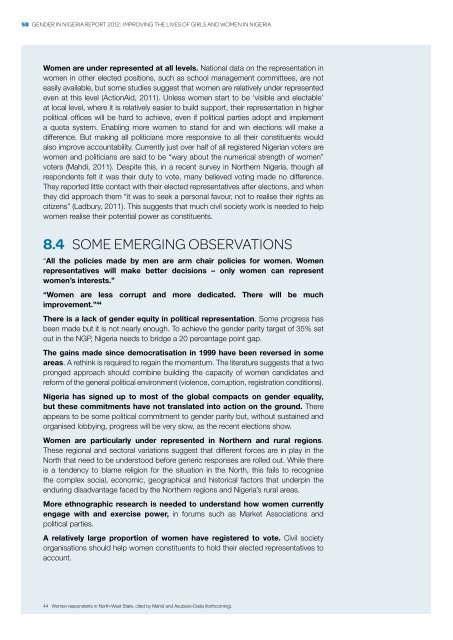Gender in niGeria report 2012 - Economic Commission for Africa
Gender in niGeria report 2012 - Economic Commission for Africa
Gender in niGeria report 2012 - Economic Commission for Africa
You also want an ePaper? Increase the reach of your titles
YUMPU automatically turns print PDFs into web optimized ePapers that Google loves.
58 <strong>Gender</strong> <strong>in</strong> Nigeria Report <strong>2012</strong>: Improv<strong>in</strong>g the Lives of Girls and Women <strong>in</strong> Nigeria<br />
Women are under represented at all levels. National data on the representation <strong>in</strong><br />
women <strong>in</strong> other elected positions, such as school management committees, are not<br />
easily available, but some studies suggest that women are relatively under represented<br />
even at this level (ActionAid, 2011). Unless women start to be ‘visible and electable’<br />
at local level, where it is relatively easier to build support, their representation <strong>in</strong> higher<br />
political offices will be hard to achieve, even if political parties adopt and implement<br />
a quota system. Enabl<strong>in</strong>g more women to stand <strong>for</strong> and w<strong>in</strong> elections will make a<br />
difference. But mak<strong>in</strong>g all politicians more responsive to all their constituents would<br />
also improve accountability. Currently just over half of all registered Nigerian voters are<br />
women and politicians are said to be “wary about the numerical strength of women”<br />
voters (Mahdi, 2011). Despite this, <strong>in</strong> a recent survey <strong>in</strong> Northern Nigeria, though all<br />
respondents felt it was their duty to vote, many believed vot<strong>in</strong>g made no difference.<br />
They <strong>report</strong>ed little contact with their elected representatives after elections, and when<br />
they did approach them “it was to seek a personal favour, not to realise their rights as<br />
citizens” (Ladbury, 2011). This suggests that much civil society work is needed to help<br />
women realise their potential power as constituents.<br />
8.4 Some emerg<strong>in</strong>g observations<br />
“All the policies made by men are arm chair policies <strong>for</strong> women. Women<br />
representatives will make better decisions – only women can represent<br />
women’s <strong>in</strong>terests.”<br />
“Women are less corrupt and more dedicated. There will be much<br />
improvement.” 44<br />
There is a lack of gender equity <strong>in</strong> political representation. Some progress has<br />
been made but it is not nearly enough. To achieve the gender parity target of 35% set<br />
out <strong>in</strong> the NGP, Nigeria needs to bridge a 20 percentage po<strong>in</strong>t gap.<br />
The ga<strong>in</strong>s made s<strong>in</strong>ce democratisation <strong>in</strong> 1999 have been reversed <strong>in</strong> some<br />
areas. A reth<strong>in</strong>k is required to rega<strong>in</strong> the momentum. The literature suggests that a two<br />
pronged approach should comb<strong>in</strong>e build<strong>in</strong>g the capacity of women candidates and<br />
re<strong>for</strong>m of the general political environment (violence, corruption, registration conditions).<br />
Nigeria has signed up to most of the global compacts on gender equality,<br />
but these commitments have not translated <strong>in</strong>to action on the ground. There<br />
appears to be some political commitment to gender parity but, without susta<strong>in</strong>ed and<br />
organised lobby<strong>in</strong>g, progress will be very slow, as the recent elections show.<br />
Women are particularly under represented <strong>in</strong> Northern and rural regions.<br />
These regional and sectoral variations suggest that different <strong>for</strong>ces are <strong>in</strong> play <strong>in</strong> the<br />
North that need to be understood be<strong>for</strong>e generic responses are rolled out. While there<br />
is a tendency to blame religion <strong>for</strong> the situation <strong>in</strong> the North, this fails to recognise<br />
the complex social, economic, geographical and historical factors that underp<strong>in</strong> the<br />
endur<strong>in</strong>g disadvantage faced by the Northern regions and Nigeria’s rural areas.<br />
More ethnographic research is needed to understand how women currently<br />
engage with and exercise power, <strong>in</strong> <strong>for</strong>ums such as Market Associations and<br />
political parties.<br />
A relatively large proportion of women have registered to vote. Civil society<br />
organisations should help women constituents to hold their elected representatives to<br />
account.<br />
44 Women respondents <strong>in</strong> North-West State, cited by Mahdi and Asubiaro-Dada (<strong>for</strong>thcom<strong>in</strong>g).

















